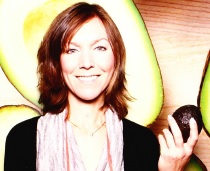
This week the Spotlight is on Krista Ulatowski, MPH, RD, a consultant dietitian with her hands in many fields– from weight management to menu development and marketing in between. This former public relations strategist shares how she discovered her true calling surrounded by barrels of beer, her love for real food, thoughts on GMOs, career aspirations and advice for anyone wanting to break into the nutrition field:
When did you realize you wanted to switch gears and get into nutrition? I spent nearly 10 years teaching big corporations how to talk to the media and engage with their customers, until one day the light bulb went on that blinked, “Why are you not pursuing your passion in the health and wellness field?”
The light bulb moment came when I was at a Seattle-area brewery, surrounded by barrels of delicious artisanal beers. But it’s not what you think! I was on a tour…and the tour guide was a registered dietitian who offered a glimpse into the world of nutritional science. Now, I had always been interested in food and nutrition. I was the nagging teenager that would try to get my mom to buy the yogurt with less sugar but kept losing the battle: “You have three younger brothers that need their calories,” she’d say. I was a high school athlete, and I rowed division I crew at the University of Wisconsin. I loved high school biology, and was fascinated by what I learned in my introductory nutrition course as an undergrad. I was told early on that I could hold my own as writer who should focus on the humanities, hence my roundabout way of landing in the sciences.
It was my undergraduate nutrition course that initially introduce me to the field, as I was learning that what I put into my body could directly affect my energy level, how shiny my hair was, or how strong my nails were…I was eating on my own for the first time in college, paying attention to the simple “lower fat” or “higher fat” labels on entrees in the cafeterias on campus, and, of course, learning about ‘good’ and ‘not so good’ fats. Additionally, it was fascinating to me that I could potentially help people live and feel better by becoming a RD. It wasn’t until years later that I knew I had to be a part of such a rapidly-changing and evolving field.
So you knew you wanted to pursue your RD– then what? I have since graduated with my Masters in nutrition and public health from the University of Washington and hold a variety of RD consulting jobs that challenge me on a daily basis. The majority of my week is spent at a weight management company that just opened its doors for business in Seattle. I find it rewarding to work one-on-one with individuals dedicated to improving their health. I also create meal plans for long-term care homes; I am a marketing assistant for another dietitian; and I consult for various corporate wellness companies.
Wow– you wear a lot of hats! Take us through a typical “day in the life” if you can!
This definitely depends on the day of the week. Typically, I start my day with a bowl full of oatmeal, mashed sweet potato and walnuts for protein. Then I get my sweat on mid-morning, either a cardio bootcamp workout or a run, and follow that up with tuna on wheat and a Greek yogurt parfait for more protein…and a few omega-3s. Then I split for “work,” whether that be traveling to a site or to my favorite local coffee shop to work remotely. There I contribute to the coffee shop’s bottom line with my latte and coconut granola habit (in separate containers, mind you), while keeping my other projects moving forward. This might be improving a menu for a client who needs to follow a pureed diet, or writing a guest blog post on refueling after a workout. I aim for an extremely-simple-to-prepare dinner such as a vegetable burger and a salad with avocado, tomatoes, peapods, corn, carrots and tahini goddess dressing, my favorite dressing this week. I typically unwind with a foodie magazine or book – I’m currently reading A Big Fat Crisis by Deborah A. Cohen, MD.
Since you work with a lot of different groups and demographics, what is the most challenging group to work with? Great question – everyone poses a challenge, in their own unique way, in my opinion. A person who looks to be the picture of health and follows a very clean way of eating asks, “What else can I do to be eating more healthfully?” Challenge. The client who has Prader-Wili syndrome and must stick to no more than 800 calories per day? Also a challenge. Clients that aren’t receptive to change and aren’t ready to make healthy adjustments to the way that they eat and move are challenging as well. It’s best to meet people on their journey to improved health, and to have them define their goals rather than to define that journey and goal for them.
 Do you follow any certain diet? The peanut butter diet. Kidding…although I do think peanut butter is a healthy snack in moderation! I eat mostly plant-based foods. I grew up in the Midwest, eating a lot of less-than-healthy processed meat with nearly every lunch and dinner – deli meats, ground beef, turkey, chicken, ham, brats, bologna, kielbasa – you name it. I try to be more balanced now and gravitate toward fish, bean burgers, tofu, vegetables, fruit and whole grains.
Do you follow any certain diet? The peanut butter diet. Kidding…although I do think peanut butter is a healthy snack in moderation! I eat mostly plant-based foods. I grew up in the Midwest, eating a lot of less-than-healthy processed meat with nearly every lunch and dinner – deli meats, ground beef, turkey, chicken, ham, brats, bologna, kielbasa – you name it. I try to be more balanced now and gravitate toward fish, bean burgers, tofu, vegetables, fruit and whole grains.
I was brought up on that Midwest diet as well! Is there any food that you won’t eat? Fast food comes to mind, as do most processed, unnatural foods. I used to have a strong sweet tooth (carrot cake – yum!) but my palate craves salty treats now, which I try to satisfy with healthier choices such as low-sodium blue corn tortilla chips. I also won’t touch bone marrow (made that mistake once), lychee, or potato chips (my dad swears I’m not his child on this last one).
What was your most memorable meal? I love this question. One that pops into my head was my first experience with sushi when I was on a business trip in Seattle from Minneapolis. My new boss brought 14 of us to a well-known sushi restaurant; I ordered a teriyaki dish on the side in case I couldn’t stomach the raw fish. With some guidance from my new colleagues as to how to use chopsticks, I helped them devour the biggest platter of sushi I have ever laid eyes on to this day.
What diet fad do you wish would disappear? I wish people would be more informed about the gluten-free diet and adopt gluten-free only when medically necessary or because they wish to reduce symptoms, rather than due to the belief that they believe they’ll lose weight by adopting a gluten-free lifestyle.
What food or nutrition related book or documentary do you think everyone read or watch? Forks Over Knives inspired me when I saw it in the theater a few years back. Given the film’s strong plant-based foods message, I switched from eating those deli meat sandwiches to eating more veggie/hummus sandwiches for lunch. A tiny change, but a change that works for me nonetheless.
What are your thoughts on GMO foods? Do you feel strongly one way or another? In graduate school, my Food Safety class staged a debate on the pros and cons of GMOs. I was assigned to the “pro” team and my conscious fought me every step of the way. Therefore, yes, I am anti-GMO and look forward to seeing GMO foods labeled as such in the supermarket and elsewhere.
What is your favorite place to go or thing to do in your city? One of my favorite places in Seattle is the Volunteer Park Conservatory. I’ll stop in there from time to time on my way home from a run and love the feeling of the sauna-like effects of the greenhouse. It’s absolutely beautiful in there, and a great place to sneak away to for a few minutes of “me” time.
What would you like to accomplish (can be career or non-career related) in the next 5 years? Career-wise, I’d like to be a corporate dietitian for a Seattle-area grocery store. Seventy-three percent of consumers say that access to nutrition and health information is very or somewhat important when selecting their primary market, according to the National Grocers Association-Supermarket Guru 2013 Consumer Panel Survey. Shoppers expect educational outreach from their supermarket – and there’s plenty of opportunities for markets to take advantage of the benefits that RDs can provide!
Do you think it should be required for RDs to have their masters? How has yours helped you in your career? I don’t believe a Masters should be required; I know many brilliant RDs that do not have an advanced degree. Mine has helped me in terms of learning about the science of food and nutrition, opening doors, providing opportunities and resources that would not have been available to me otherwise.
As someone who turned nutrition into their second career, do you have any advice for those out there that are thinking about getting into a nutrition-related field? Yes. If you are interested in the field, shadow RDs, do your research, talk to current students and recent graduates in the field, and sit in on several courses at the university that you are interested in attending. Make the leap if it feels right to you! I joke with friends and family that I was going to be the “most mature” person in my pre-requisite courses but soon was reminded that education is age-less…it’s never too late to jump ship and follow your heart.
Connect with Krista:
Email: krista.ulatowski@gmail.com
Twitter: @PhytoK
Thank you Krista for this glimpse into your dynamic life as a registered dietitian!


